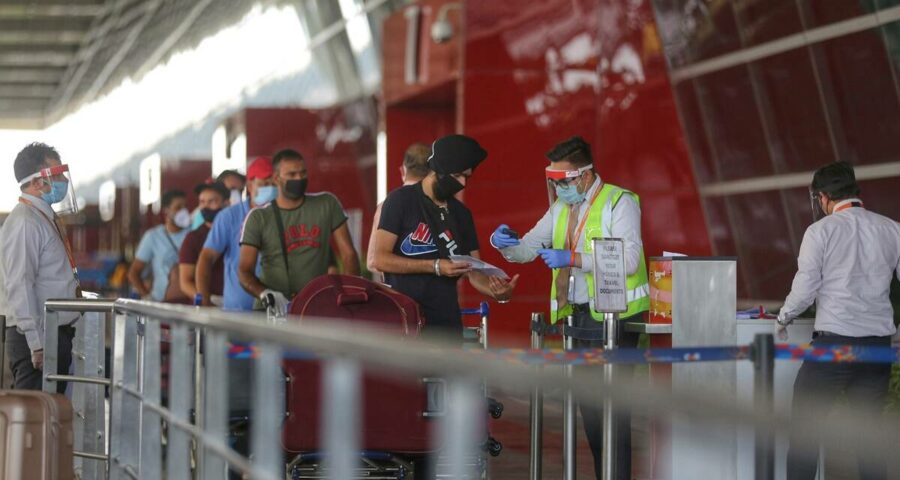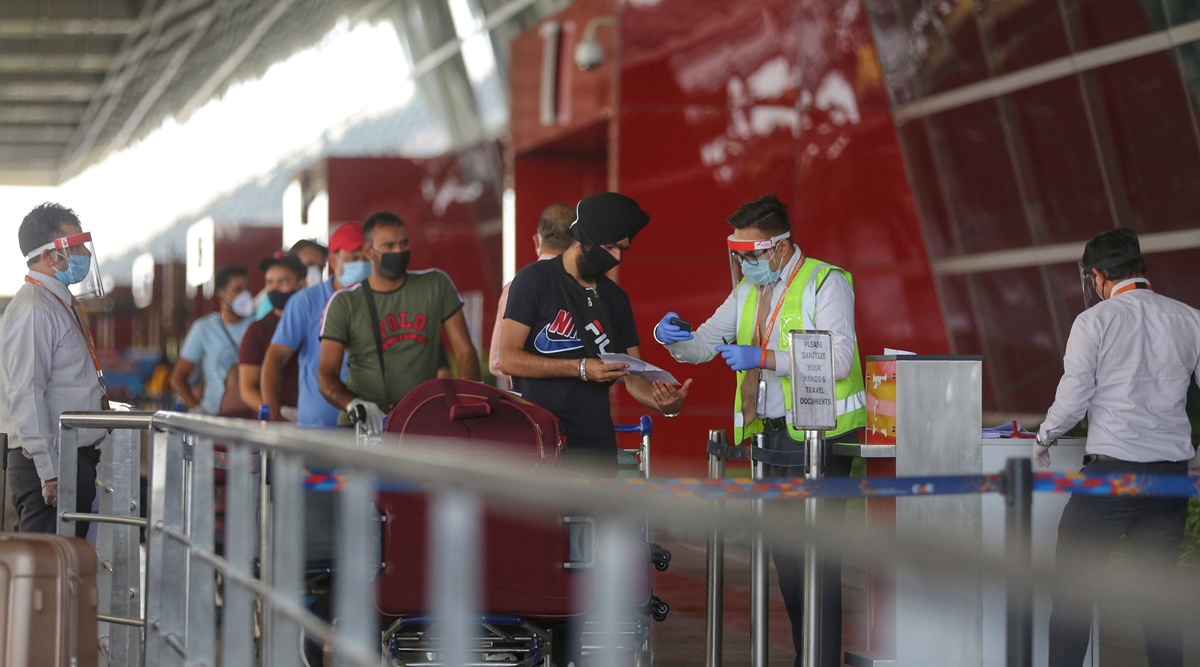Omicron variant: In a review meeting with states and UTs, the Centre on Tuesday advised them to ramp up testing for the early identification of Covid cases and ensure adequate infrastructure for management and isolation.
With the threat of a third Covid wave looming large over the country, several states have imposed restrictions to keep the spread of the new variant — Omicron — at bay. In a review meeting with states and UTs, the Centre on Tuesday advised them to ramp up testing for the early identification of Covid cases and ensure adequate infrastructure for management and isolation.
Here are some of the measures taken by the states to curb the spread of infections:
Delhi
Delhi Chief Minister Arvind Kejriwal on Tuesday questioned the delay in stopping flights from countries affected by the Omicron variant — a demand he placed before the Prime Minister on Sunday. Meanwhile, the Delhi Disaster Management Authority, after a meeting on Monday, asked the state health department to make sure there are enough hospital beds, medicines, and medical oxygen in the city. The national capital will be sticking to the test, track, treat strategy earnestly, and will follow up with international passengers who have to be placed under home isolation.
The Lok Nayak Hospital has been identified as the dedicated facility to treat patients testing positive for the new Covid variant. Apart from these, keeping up with the Centre’s guidelines, all passengers who come from high-risk countries will have to undergo RT-PCR tests at the airport. The samples of those who test positive will be sent for genome sequencing.
Maharashtra
In Mumbai, the Brihanmumbai Municipal Corporation (BMC) has instructed the dean of all jumbo centres and ward officers to keep the facilities ready so that they can be activated within a day, if needed. BMC is also planning to ramp up vaccinations by organising special campaigns in private and public with a large number of unvaccinated employees.
On Monday, State Tourism Minister Aditya Thackeray held a review meeting on Covid readiness and the new strain. During this meeting, private hospitals were informed to have at least one ward for treatment of Covid patients.
In Pune, the district administration would be launching a special information and communication drive to help dispel misconceptions about the virus and to speed up the vaccination process. Pimpri-Chinchwad Municipal Corporation (PCMC) has decided to quarantine those returning from foreign countries, especially South Africa, as well as instate mandatory RT-PCR testing for international travellers.
Punjab
Punjab Deputy Chief Minister Om Prakash Soni on Monday directed all the health officials to ensure strict monitoring of passengers coming into the state, especially from South Africa, Brazil, Bangladesh, Botswana, China, Mauritius, New Zealand, Zimbabwe, Singapore, Hong Kong and Israel where cases of the new variant have been detected recently.
The healthcare officials were instructed to ensure adequate medicines and equipment. They were also directed to keep up with the Centre’s guidelines on mandatory testing of international travellers, home quarantine for those testing negative and genomic surveillance and isolation for those testing positive.
Chandigarh, too, decided to increase Covid testing and vaccination in the city. At Health and Wellness Centres and other hospitals, efforts will be made to start Covid testing for patients visiting OPDs and upload the testing data on a portal. Apart from this, the city is ensuring an adequate supply of testing kits, medicines and oxygen.
Karnataka
Karnataka Chief Minister Basavaraj Bommai on Monday said ruled out an immediate lockdown in the state. He added that travellers from countries where the Omicron variant has been detected are being tested on arrival at the airports.
For those coming in from Kerala, a Covid-negative report is mandatory. Moreover, they have to undergo a second test on the seventh day after entering Karnataka.
The state government has also written to the Centre seeking booster doses for frontline workers who were the earliest to receive vaccines. They will also be ramping up the vaccination drive and urged the 45 lakh people due for the second dose to get the jab.
Tamil Nadu
Tamil Nadu Health Secretary J Radhakrishnan has directed district administrators and other agencies to ramp up surveillance on people returning or transiting from “at risk” countries in coordination with central agencies.
He has also asked authorities to ramp up surveillance and sequencing efforts to understand Covid-19 variants, perform field investigations and laboratory assessments to improve understanding about the potential impact of Omicron and enforce all Covid-19 preventive measures.
Jammu and Kashmir
The Jammu and Kashmir Government has directed the Deputy Commissioners to enhance the testing rate and contact tracing for positive patients to trace infection trajectory and establish micro-containment zones at an early stage.
It will also be keeping up with the Centre’s guidelines for international travellers. According to an official release, it was emphasised that de-boarding from international flights must comply with the Covid-appropriate behaviour (CAB) and set protocols, and a special Covid helpdesk is forthwith established at the Srinagar airport.
Moreover, the Health Department has been asked to establish genome sequencing facilities at Government Medical Colleges, Srinagar and Jammu as well as government quarantine centres in Budgam and Srinagar.
Uttar Pradesh
The Lucknow administration issued separate protocols for international and domestic arrivals. At the international terminal, the protocols have been set as per the Centre’s guidelines. Whereas at the domestic terminal, thermal screening is a must for all travellers and RT-PCR would be conducted for travellers who present some symptoms.
Madhya Pradesh
The state government will trace, test and if need be, isolate international passengers who have arrived in the state in the past month. The state has also decided to ramp up genome sequencing.
Telangana
The government said on Sunday that it has strengthened the surveillance system and alerted teams. Fully vaccinated passengers arriving from ‘at risk’ countries will be quarantined at home and be monitored.
Source: Read Full Article


